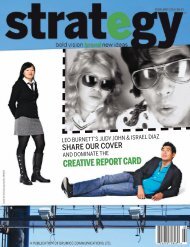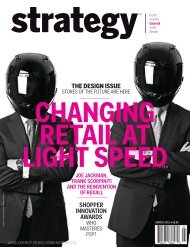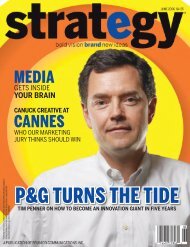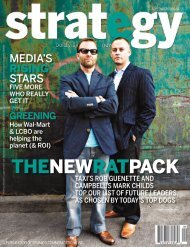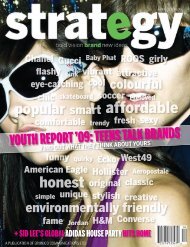TAXI DELIVERS KNOCKOUT PUNCH - Strategy
TAXI DELIVERS KNOCKOUT PUNCH - Strategy
TAXI DELIVERS KNOCKOUT PUNCH - Strategy
You also want an ePaper? Increase the reach of your titles
YUMPU automatically turns print PDFs into web optimized ePapers that Google loves.
There is a saying that goes “The<br />
anticipation is always greater than<br />
the actual event.” In the vernacular of<br />
consumer culture, we call this<br />
“lunchbag letdown.”<br />
It happens all the time in advertising,<br />
package design and any other medium of<br />
persuasion. The burger on the billboard is<br />
always juicier, and its toppings crisper, than<br />
that greyish patty and its limp bunmates<br />
on your plate.<br />
This is the raison d’être for a<br />
brand experience program. When<br />
you break experience down into the<br />
three components of perception (the<br />
expectations you have before you buy),<br />
interaction (what happens when you<br />
experience the product) and recollection<br />
(how you feel afterwards), you are taking<br />
the fi rst step on the road to preventing<br />
lunchbag letdown.<br />
Traditionally, companies have spent<br />
most of their marketing money on image<br />
and perception – 80% or more, in fact<br />
– and very little on recollection. A recent<br />
study in the Journal of Experimental<br />
Psychology by Leaf Van Boven of the<br />
University of Colorado at Boulder and<br />
Laurence Ashworth of the Queen’s School<br />
of Business (“Looking Forward, Looking<br />
Back: Anticipation is More Evocative than<br />
Retrospection”) seems to support this<br />
habit with evidence that people report<br />
more intense emotions during anticipation<br />
of emotional events than in retrospection.<br />
In other words, you get a lot more<br />
juiced thinking about your next burger<br />
than you do thinking about your last<br />
one. That’s what makes advertising and<br />
packaging so effective. At their best, they<br />
manipulate emotional arousal when we<br />
are most susceptible.<br />
What they can’t do is win us back after<br />
expectations are not met. But that’s<br />
what brand experience is for. It aligns the<br />
promise with the delivery.<br />
Sometimes perceptions and experiences<br />
align, but not often. They align when the<br />
agency builds its campaign around a brand<br />
BY WILL NOVOSEDLIK<br />
Mind the gap...<br />
truth and the experience delivers it. One<br />
excellent example is Target’s campaign<br />
for Newfoundland and Labrador Tourism.<br />
Based on the genuine experience of<br />
travelling off the beaten track, Target<br />
painted Newfoundland and Labrador<br />
as creative, smart, hip and quirky. From<br />
the hybrid font used in the logo to the<br />
heart-tugging music and awe-inspiring<br />
landscapes in the TV spots to the warm<br />
and welcoming people, Target captured the<br />
soul of the place.<br />
They created an emotionally compelling<br />
perception, which in turn created<br />
convincing returns. At a time when<br />
tourism was at low levels across North<br />
America, N&L saw 1.2% more visitors and<br />
4% more non-resident air visitors and a<br />
2.7 rise in accommodation occupancy<br />
levels over 2007.<br />
Travel & Leisure magazine named it<br />
one of “40 trips that will change your<br />
life” and visitors raved: “Paradise found!”<br />
“Newfoundland is one of the most<br />
awesome places in Canada. The water,<br />
the mountains, the fi sh, the whales, the<br />
icebergs and the wonderful people!” “I’d<br />
move to Newfoundland in a heartbeat! The<br />
people are friendly, the food great and the<br />
scenery breathtaking.” Bingo! Perception,<br />
interaction and a damn fi ne recollection,<br />
all lined up.<br />
The gap in emotional intensity between<br />
anticipation and retrospection, to use<br />
terms from the Van Boven/Ashworth<br />
experiment, can also be upended by a<br />
“moment of truth.” This is a situation<br />
in which a mistake is overturned by a<br />
“delight tactic” – an act that exceeds the<br />
customer’s expectation.<br />
Here’s a Christmas story for you. My<br />
business partner ordered a down jacket<br />
from Lands’ End for her husband. She<br />
received it the week before Christmas, but<br />
they sent the wrong size. The customer<br />
care rep, Molly, called my partner at<br />
home for three days trying to fi gure out<br />
how to get the right size to her in time for<br />
Christmas. The best she could do was<br />
brandexperience<br />
Boxing Day. Molly felt so badly that she<br />
sent an apology and a gift card worth $100<br />
a week later.<br />
In this case, the perception was created<br />
by the Lands’ End website, which states: “If<br />
you’re not satisfi ed with any item, simply<br />
return it to us at any time for an exchange<br />
or refund of its purchase price. We mean<br />
every word of it. Whatever. Whenever.<br />
Always. Guaranteed. Period.”<br />
They didn’t need to send a gift certifi cate<br />
to live up to the guarantee, but Molly<br />
sensed disappointment and responded<br />
with an over-the-top gesture. As a result,<br />
my partner is now a devoted customer.<br />
Both Lands’ End (sounds like a place<br />
in Newfoundland, doesn’t it?) and<br />
Newfoundland and Labrador spent their<br />
“perception” budget wisely, but only<br />
because they were able to deliver. Wish<br />
that more brands acted that way.<br />
Will Novosedlik is a partner at<br />
Chemistry, a brand management<br />
consultancy that bridges the gap between<br />
management consulting and creative<br />
consulting to drive competitive advantage<br />
for clients in North America, Europe and<br />
emerging markets. He can be reached at<br />
will@chemistrybranding.com.<br />
Target’s ads<br />
delivered the<br />
tourists, and The<br />
Rock delivered on<br />
the experience<br />
promise<br />
STRATEGY November 2008 97



